Oct 16, 2022
Before the COVID-19 pandemic hit, Luzmila Huarag held her life and the lives of her children in a fine balance. A single mother to three children in the San Juan de Lurigancho district of Lima, Peru, she was running a small business selling tamales and looking forward to resuming her studies to become a teacher. Life was not easy, but she was managing.
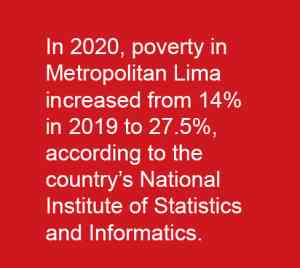 The pandemic changed everything. During lockdown, she and millions of others in Peru were left without an income and no way to provide for their families. Globally, the number of people without adequate nutrition surged during the pandemic, but the situation was especially dire in Peru, with poverty rates rising exponentially.
The pandemic changed everything. During lockdown, she and millions of others in Peru were left without an income and no way to provide for their families. Globally, the number of people without adequate nutrition surged during the pandemic, but the situation was especially dire in Peru, with poverty rates rising exponentially.
“All of the doors that had been open before were closed to me. I became very desperate. It felt like everything was lost,” says Luzmila, 43.
It was at this low point that women in her neighbourhood and other communities across Lima began organizing communal meals to ensure that families received at least one decent meal a day.
“Eight women do the cooking. We cook every day for 100 people, feeding 40 families,” Luzmila says of her own neighbourhood. “We also feed elderly people and others who cannot do their own cooking. I have no other income. With the community kitchen I can be sure that my family will be fed.”
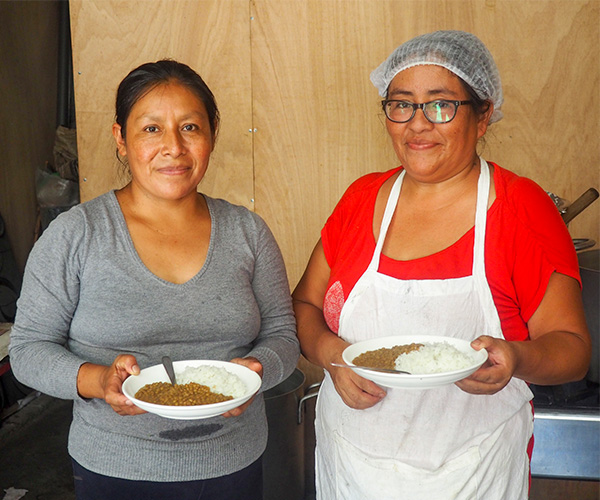
Griselda Congachi & Luzmila Guaraj, Lima, Peru. Photo: Julia Stomal
These “Common Pots” or community soup kitchens have expanded across Lima, providing a unique social protection network against the escalating hunger crisis. The food is grown mainly by migrant women from the interior of the country who, against all odds, have transformed degraded and dry areas into spaces that allow them to produce food for their families and contribute to the common pots. To date, more than 2,500 community kitchens have fed nearly 250,000 families and a Common Pot Network and Food Security Board was established by local government, community kitchen leaders, and civil society organizations to coordinate the effort.
But the work of the common pots goes beyond nourishment. The groups also support social engagement, solidarity, and connectivity among people whose voices are rarely heard. Unfortunately, they also have a weak institutional framework that marginalizes them from the policies implemented.
To strengthen the networks and help organize and influence a food system that supports the needs of the urban poor in Lima, Ottawa, Ontario-based charity Cuso International developed the Mujeres Unidas por la Seguridad Alimentaria y Ambiental (MUSA)/Women United for Food and Environmental Security project, which began in January 2022. The project links women farmers with women’s networks to share knowledge, advocate for food security, and support women’s participation in decision-making. A $10,000 grant from the Gay Lea Foundation in May helped support environmental components of the project, such as agro-ecological innovations for greater production and entrepreneurship. This includes efficient water collection and reuse, diversified food production and processing, and improved access to local resources such as seeds, compost, environmentally safe pest control, and technical assistance. The project also incorporates engagement with supportive organizations and volunteers to ensure sustainability.
“This project creates a groundswell of mutual support and enables knowledge exchange among women and communities,” says Pilar García, Cuso Country Representative, Peru. “Women living in poverty will learn how to exercise their rights, use their expertise to be effective participants in decision-making, and rethink current approaches to accessing nutritious food.”
 As part of the MUSA project, Luzmila and other women in her neighbourhood have received agricultural inputs and supplies for their r community garden, from which they harvest the vegetables for the meals they cook throughout the week and share produce with families in the community to use in their own meal preparation. They have also received training on nutrition and how to establish agroecological gardens, including how to make compost and natural pest-control.
As part of the MUSA project, Luzmila and other women in her neighbourhood have received agricultural inputs and supplies for their r community garden, from which they harvest the vegetables for the meals they cook throughout the week and share produce with families in the community to use in their own meal preparation. They have also received training on nutrition and how to establish agroecological gardens, including how to make compost and natural pest-control.
Luzmila has also received training in women’s empowerment and decision-making and has been connected to a women’s network that shares valuable knowledge, experience, and best practices.
“I hope in the future my children will have more opportunities, so they can attend university and become professionals,” says Luzmila. “I also hope I can resume my studies. I wish that all the women in my community could have access to more training opportunities, so they can follow their dreams.”
“Cuso International is grateful to the Gay Lea Foundation for their generous support of this project,” says Pilar Garcia, Cuso International Country Representative in Peru. “Together we are helping to increase access to healthy food and improve the lives of many families in our community. Thank you for extending your co-operative inspired values to women farmers in Lima.”

Nov 3, 2025
Gay Lea Foods Co-operative Limited (“Gay Lea Foods”) today announced it has received the PRISM Certified designation from Imagine Canada, recognizing the Canadian dairy co-operative’s commitment to...
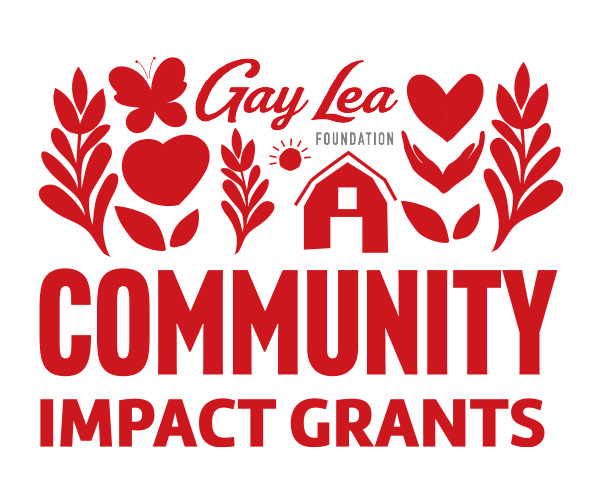
Oct 21, 2025
As co-operatives recognize Co-op Week and the United Nations’ International Year of Co-operatives, the Gay Lea Foundation is proud to announce the recipients of its fall 2025 charitable grants.
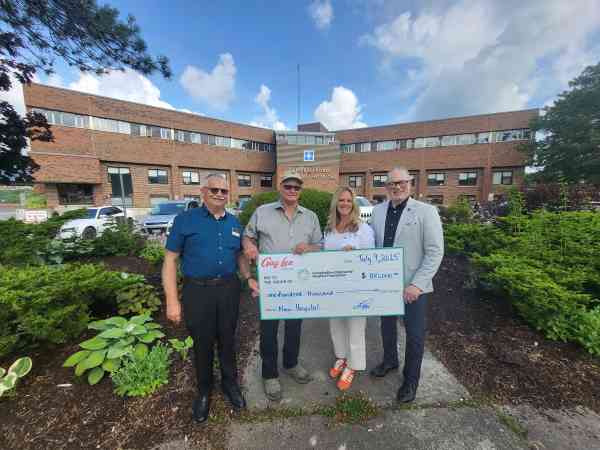
Jun 2, 2025
Spring 2025 grants announced to support health, agriculture, and community well-being projects across Canada and internationally
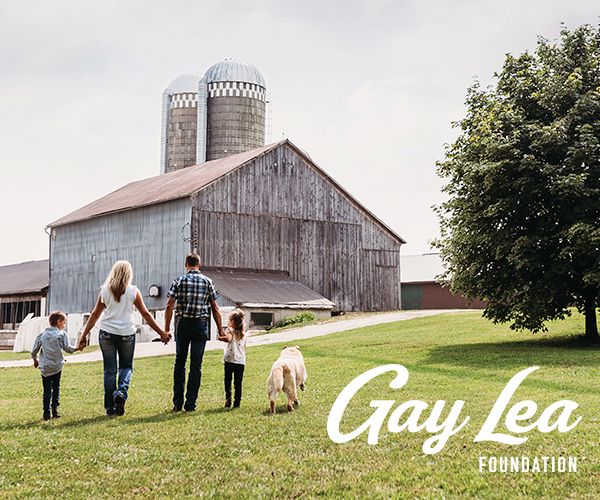
Feb 12, 2025
The Gay Lea Foundation today announced applications are now open for its Community Impact Grants program, supporting initiatives in education, health, wellness, poverty relief and sustainable agriculture...